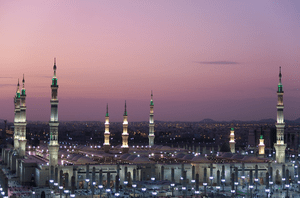Absorb the Adhān into Your Heart
Always hearing a particular sound can make us indifferent to it. As it melds into the background, we may fail to appreciate its significance.
Imām al-Ghazālī (raḥimahullāh) explains that on hearing the mu’addhin’s call to prayer, remind yourself about how terrifying the call for the Day of Judgement will be. Be eager and prepare yourself physically and spiritually for this call (i.e. the adhān) in this world. If you are of those who hastened to respond to this call in this world, then know that your name will be called out gently on that Terrifying Day.
Another feeling you may experience whilst listening to the adhān is calm and joy. Ibn al-Qayyim (raḥimahullāh) explains that if your heart leaps with joy when you hear the adhān in the dunyā, then only bliss and triumph will accompany your ‘call’ on the Day of Reckoning. It is for this reason that the Prophet ﷺ said, “Bilāl, give us comfort through ṣalāh” (Aḥmad). As his happiness lay in ṣalāh, he was eager to enter it and would ask Bilāl (raḍiy Allāhu ‘anhu) to commence it by delivering the adhān.
Respond to the Adhān
Responding attentively to the mu’adhdhin while contemplating on the inner and deeper meanings of the words will help you attain khushūʿ in your ṣalāh:
| After the Mu’addhin says… | You say… |
|---|---|
| اللهُ أَكْبَرُ (Allah is the Greatest.) | اللهُ أَكْبَرُ (Allah is the Greatest.) |
| أَشْهَدُ أَنْ لَّا إِلٰهَ إِلَّا اللهُ (I bear witness that there is no god worthy of worship except Allah.) | أَشْهَدُ أَنْ لَّا إِلٰهَ إِلَّا اللهُ (I bear witness that there is no god worthy of worship except Allah.) |
| أَشْهَدُ أَنَّ مُحَمَّدًا رَّسُوْلُ اللهِ (I bear witness that Muḥammad is the Messenger of Allah.) | أَشْهَدُ أَنَّ مُحَمَّدًا رَّسُوْلُ اللهِ (I bear witness that Muḥammad is the Messenger of Allah.) |
| حيَّ عَلَى الصَّلَاة (Come to Ṣalāh.) | لَا حَوْلَ وَلَا قُوَّةَ إِلَّا بِالله (There is no power to achieve good or might to avert evil except through Allah.) |
| حَيَّ عَلَى الْفَلَاح (Come to success.) | لَا حَوْلَ وَلَا قُوَّةَ إِلَّا بِالله (There is no power to achieve good or might to avert evil except through Allah.) |
| اللهُ أَكْبَرُ اللهُ أَكْبَرُ (Allah is the Greatest, Allah is the Greatest.) | اللهُ أَكْبَرُ اللهُ أَكْبَرُ (Allah is the Greatest, Allah is the Greatest.) |
| لَا إِلٰهَ إِلَّا اللهُ (There is no god worthy of worship except Allah.) | لَا إِلٰهَ إِلَّا اللهُ (There is no god worthy of worship except Allah.) |
1)
The Messenger of Allah ﷺ instructed us to repeat the words of the mu’adhdhin during ṣalāh. This is with the exception of the following phrase “…when he says حيَّ عَلَى الصَّلَاة ، حَيَّ عَلَى الْفَلَاح, say: لَا حَوْلَ وَلَا قُوَّةَ إِلَّا بِالله. If he says it from his heart, he shall enter Paradise” (Muslim).
Al-Ṭībī (raḥimahullāh) wrote, “The meaning of حيَّ عَلَى الصَّلَاةِ ، حَيَّ عَلَى الْفَلَاحِ is come with your exterior and interior to guidance and triumph immediately. Therefore, it is only appropriate that one (responds to this) by saying that this is a great matter which – due to my weakness – I am unable to carry out unless Allah (‘azza wa jall) allows me to, through His might and power.”
The phrase لَا حَوْلَ وَلَا قُوَّةَ إِلَّا بِالله is one of the treasures of Paradise (Tirmidhī). Imām al-Nawawī (raḥimahullāh) explains that this is because it embodies complete submission, the entrusting of one’s affairs and true obedience of Allah. Thus, this phrase acknowledges that Allah is the only Creator and none can turn back His Command, and that the slave is powerless in his own affairs.
What does لَا حَوْلَ وَلَا قُوَّةَ إِلَّا بِالله mean?
A slave cannot move from one situation to another (ḥawl), nor does he have the strength (quwwah) to do this except by the will and help of Allah (‘azza wa jall).
There is no power to stop sinning/avert evil, nor is there any strength to be obedient/attain good except by the will and help of Allah.
After the Adhān
Following the completion of the adhān, recite the following phrases (in this order):
2)
وَأَنَا أَشْهَدُ أَنْ لَّا إِلٰهَ إِلَّا اللهُ وَحْدَهُ لَا شَرِيْكَ لَهُ ، وَأَنَّ مُحَمَّدًا عَبْدُهُ وَرَسُوْلُهُ ، رَضِيْتُ بِاللهِ رَبًّا ، وَبِمُحَمَّدٍ رَسُوْلًا ، وَبِالْإِسْلَامِ دِيْنًا
I also bear witness that there is no god worthy of worship but Allah. He is Alone and He has no partner whatsoever, and that Muḥammad ﷺ is His servant and His Messenger. I am satisfied with Allah as my Lord, with Muḥammad as my Messenger, and with Islam as my religion.
The Messenger of Allah ﷺ said, “If anyone says [the above] on hearing the mu’adhdhin, his sins will be forgiven” (Muslim).
3)
اَللّٰهُمَّ صَلِّ عَلَىٰ مُحَمَّدٍ ، وَعَلَىٰ آلِ مُحَمَّدٍ…
The Messenger of Allah ﷺ said, “When you hear the mu’adhdhin calling for the prayer, repeat his words then send blessings upon me. The one who sends blessings upon me once, Allah will send 10 blessings upon him” (Muslim).
4)
اَللّٰهُمَّ رَبَّ هٰذِهِ الدَّعْوَةِ التَّامَّةِ وَالصَّلَاةِ الْقَائِمَةِ ، آتِ مُحَمَّدًا الْوَسِيْلَةَ وَالْفَضِيْلَةَ ، وَابْعَثْهُ مَقَامًا مَّحْمُوْدًا الَّذِيْ وَعَدْتَّهُ
O Allah, Lord of this perfect call and established prayer, grant Muḥammad the status (the highest station in Paradise) and pre-eminence (superiority over the rest of the creation), and resurrect him to the praiseworthy station that You have promised him.
The Messenger of Allah ﷺ said, “Whoever says [the above] after the adhān shall receive my intercession on the Day of Judgement” (Bukhārī).
5)
After the adhān and before the iqāmah you should make duʿā’, as the Messenger of Allah ﷺ said, “Duʿā’ is not rejected between the adhān and the iqāmah” (Tirmidhī).
5 FOR 5
- Glad tidings of Paradise.
- Forgiveness of all sins.
- Ten blessings from Allah.
- Intercession of the Prophet
- Acceptance of duʿā’.
After al-Rabīʿ b. Khuthaym (raḥimahullāh) became partially paralysed, he used to go to the Masjid helped by two men. It was said to him, “O Abū Yazīd! You may pray at home, as you are excused.” He said, “Whoever hears حَيَّ عَلَى الْفَلَاح should answer it even by crawling.”






